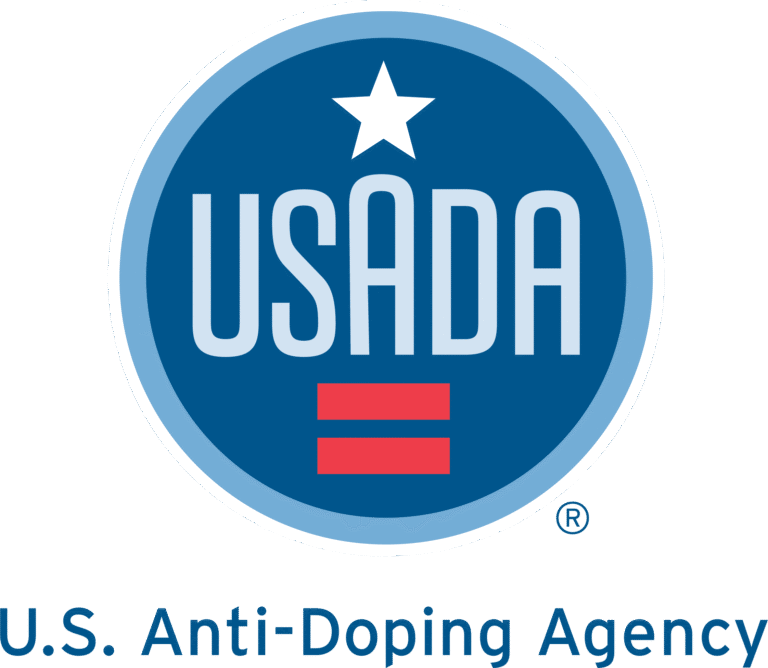Emergency Treatment or Emergency Surgery?
Please seek medical care prior to submitting a TUE or TUE Pre-Check Form. Keep any medical documents received during care and check medication status on Global DRO.
Please review the Surgery Checklist for a detailed list of information regarding emergent/non-emergent situations.

Is your medication
Prohibited or Permitted?
First, check Global DRO to find out the status of your prescription and over-the-counter medications. Go to GlobalDRO.com, search each medication by brand name or active ingredients, and compare your search results with the table below. Be sure to keep record of your Global DRO Reference number from your search (found in the bottom left corner of your results page).
Compare Your Global DRO Results
Using the Global DRO results for each substance, compare your findings to the table below to see if a TUE is necessary. If you have any questions regarding the necessity of a TUE, please fill out and submit the TUE Pre-Check Form below or contact USADA.
| Global DRO Results | TUE Instructions | ||
| In-Competition | Out-of-Competition | Registered Testing Pool (RTP), Clean Athlete Program (CAP), and Education Pool (EP) Athletes | All Other Athletes |
| STOP HERE – A TUE is not required for this substance. | STOP HERE – A TUE is not required for this substance. | ||
| A TUE is required to use or have this substance in your system during the in-competition period. | Please fill out the TUE Pre-Check Form below. | ||
| A TUE is required to use this substance at any time. | Please fill out the TUE Pre-Check Form below. | ||
| Please read the “Additional Info” section on your GlobalDRO search results to determine if a TUE is needed. Please fill out the TUE Pre-Check Form or contact USADA if you need clarification on the conditions. | |||
Can’t find your product?
Dietary Supplements
It might be a dietary supplement. TUEs cannot be issued for dietary supplements. Learn more about how you can realize, recognize, and reduce the risks associated with supplements at Supplement Connect
Still have questions?
Reach out to USADA’s Drug Reference Phone Line (linked) to speak to an expert for answers to your questions on substances and methods.
If a recommended medication is prohibited, athletes are required to take precautions to not only meet their medical needs but also abide by the anti-doping rules. Athletes in the Registered Testing Pool (RTP), Clean Athlete Program (CAP), and Education Pool (EP) require a TUE in advance of the use of a prohibited substance or method. All other athletes, including recreational athletes, should submit a TUE Pre-Check Form to USADA to determine if a TUE is required.
Please complete and submit the form below to determine if you need to apply for a TUE for your medication in question. A copy of this form will be sent to the email address entered below. If you do not receive a copy, please check your spam folder and/or resubmit the form and verify the email address is correct. Once this form is submitted successfully, you will receive a response from the USADA TUE and Drug Reference Department within 3-5 business days.
**PLEASE NOTE THAT IT MAY TAKE 3-5 BUSINESS DAYS TO RECEIVE A RESPONSE.**
Submit Pre-Check Form
TUE Pre-Check
Do I Need a TUE?

Definitions
Read specific definitions of terms to help your Pre-Check submission
Definitions:
Code Signatory Sport Organization: Sport organizations who have officially accepted the World Anti-Doping Code as their core document to harmonize their anti-doping policies, rules, and regulations.
Elite/Professional IF or NGB Membership/License: Membership or license issued by an International Federation or National Governing Body for Athletes who meet criteria as highly competitive professional Athletes. This excludes memberships/licenses in the Age-Group, Junior, Collegiate, Masters, or General categories.
International or National Championship: Competing at the highest level at sporting events such as World Championships for an International Federation or Major Event Organization OR National Championships for National Governing Bodies of Olympic/Paralympic Sport. — Age-Group, Junior or Masters National Championships are excluded from this.
International Event: An Event or Competition where the International Olympic Committee, the International Paralympic Committee, an International Federation, a Major Event Organization, or another international sport organization is the ruling body for the Event or appoints the technical officials for the Event.
International-Level Athlete: Athletes who compete in sport at the international level, as defined by each International Federation, Major Event Organization, or other international sport organization’s anti-doping rules, consistent with the International Standard for Testing and Investigations.
Footnote: For purposes of this Policy, this will typically include Athletes designated by one or more International Federation as being within the Registered Testing Pool or other whereabouts information pool for the International Federation, or any Athlete planning to compete in an International Event.
National Governing Body (NGB): National Governing Bodies are organizations that govern and manage all aspects of their individual sports within the United States. NGBs are responsible for training, competition and development for their sports, as well as nominating athletes to the U.S. Olympic and Paralympic teams. They also govern and administer areas such as but not limited to – rules and regulations, anti-doping, sport eligibility, membership, officiating, child protection and equality and competitions/events
National-Level Athlete: Any Athlete who is in the USADA Registered Testing Pool, Clean Athlete Program, or Education Pool, or who has been within the last ten years (but is not currently) included within any Registered Testing Pool or other whereabouts information pool maintained by any International Federation or National Anti-Doping Organization, and does not otherwise meet criteria to be considered an International-Level Athlete is a National-Level Athlete. And any Athlete who is selected or is otherwise on a team representing any country in an International Event in an open/elite category or, within the five years prior to committing any anti-doping rule violation, was an International-Level Athlete, National-Level Athlete, or represented any country in an International Event in an open category is a National-Level Athlete.
Open/Elite/Professional: Any competitive category that DOES NOT include Age-Group, Junior, Collegiate, Masters, or other amateur classifications.
Whereabouts Information Pool: The top tier is the Registered Testing Pool (RTP) & includes Athletes (International and/or National) subject to the greatest amount of Testing who are required to provide whereabouts in accordance with Article 4.8.6.2. The tiers below the International and/or USADA RTP include the USADA Clean Athlete Program (CAP) & USADA Education Pool (EP).
USOPC: United States Olympic & Paralympic Committee.
Apply for or Renew your TUE Here
If you determined that a Therapeutic Use Exemption (TUE) is needed or if your TUE is nearing it’s expiration date or has already expired, please follow the link below to complete and submit your TUE application or renewal.
Please note: any TUE application submitted to USADA without medical documentation will be returned to the athlete and will not be processed.
TUE Resources
Therapeutic Use Exemption Rules and Policy Details

WHAT HAPPENS TO MY TUE?
TUE applications are reviewed by medical professionals who are members of an independent TUE Committee (TUEC), which must be comprised of medical experts with various areas of medical specialty, ranging from endocrinology to psychiatry. The USADA TUEC currently includes more than 20 medical professionals, many of whom are practicing physicians, work with athletes, and publish research in their field of specialty. Here’s what you need to know about the journey of a TUE, from the diagnosis to the TUE decision.
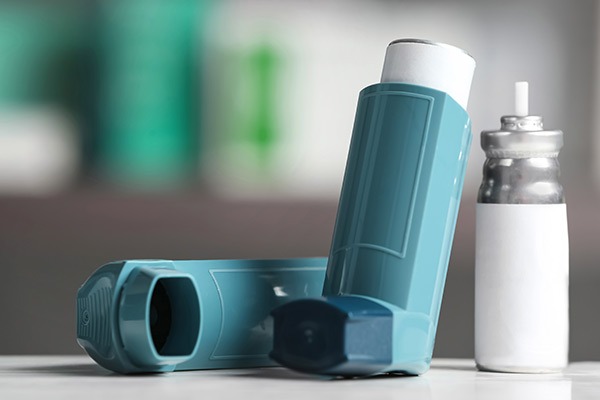
USADA’S TUE POLICY
USADA’s Policy for Therapeutic Use Exemptions is based upon the relevant provisions of the World Anti-Doping Code and the provisions of the World Anti-Doping Agency International Standard for Therapeutic Use Exemptions. This Policy outlines the full rules athletes and their support personnel must follow when a TUE is required.

WADA’S INTERNATIONAL STANDARD ON THERAPEUTIC USE EXEMPTIONS
The purpose of the International Standard for Therapeutic Use Exemptions (ISTUE) is to ensure that the process of granting TUEs is harmonized across sports and countries. This policy balances the necessity for athletes to have access to important medication, while ensuring clean athletes the right to compete on a clean and level playing field.
In some situations, an athlete may have an illness or condition that requires the use of medication listed on the World Anti-Doping Agency’s Prohibited List. USADA can grant a Therapeutic Use Exemption (TUE) in these situations in compliance with the WADA International Standard for TUEs. The TUE application process is thorough and designed to balance the need to provide athletes access to critical medication while protecting the rights of clean athletes to compete on a level playing field.
The health and well-being of the athlete must always remain the priority. Consequently, while it is always preferable for athletes to apply in advance for a TUE, this is not always possible, especially when athletes require immediate or emergency medical treatment. The health and safety of the athlete is paramount, and no treatment should be withheld that would result in the athlete’s health being compromised.
Here’s what you need to know about the journey of a TUE, from the diagnosis to the TUE decision.
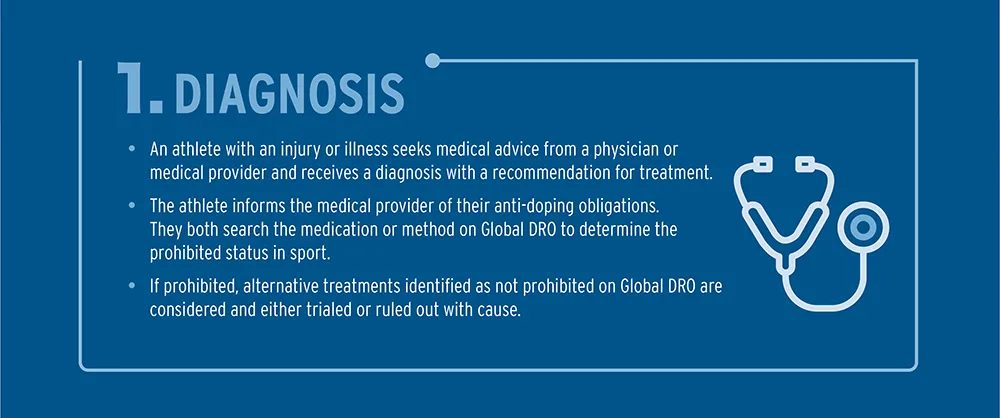
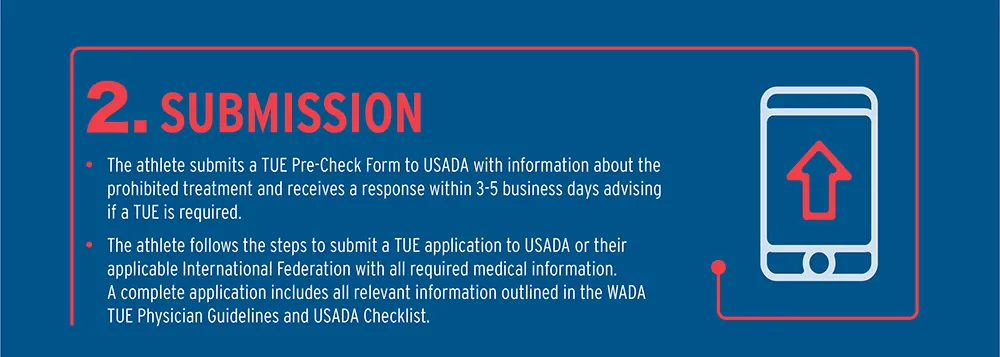
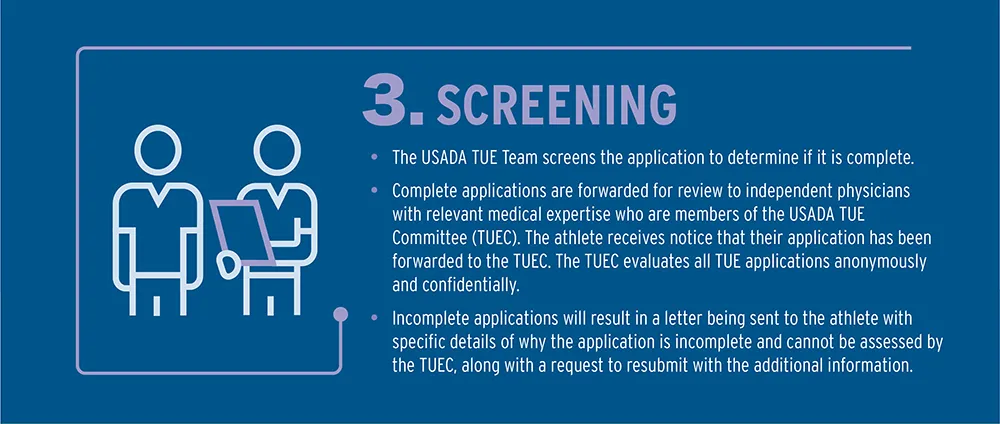
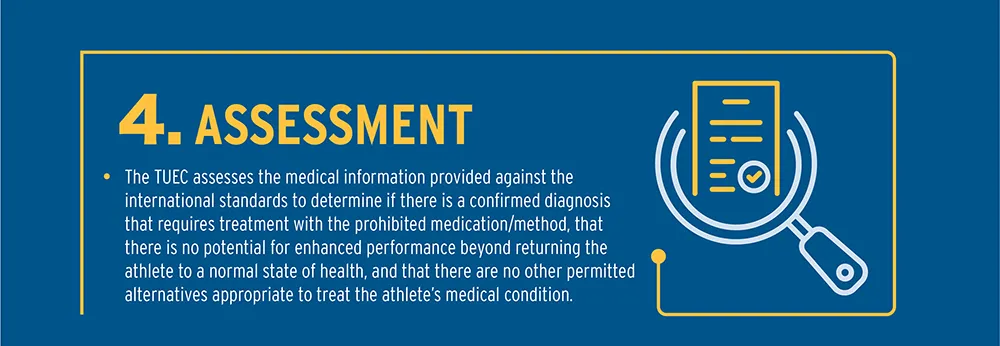
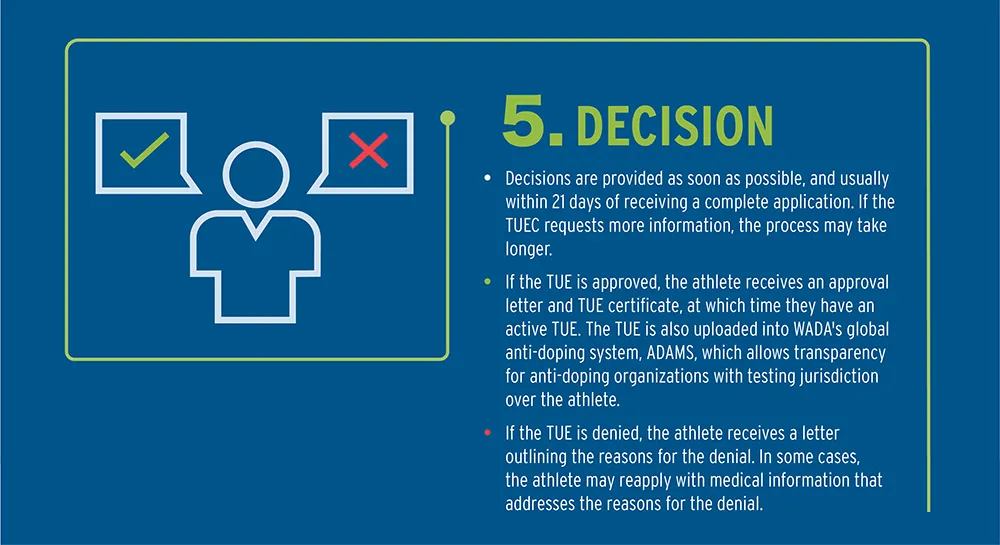
Frequently Asked Questions
Find answers to commonly asked questions about Therapeutic Use Exemptions and the application process.
Click on the question to drop down the answer.
Do I need a Therapeutic Use Exemption (TUE) to use a prohibited substance / medication / method?
This will depend on your competition level (whether you are an international, national, recreational athlete or sport participant) and the Prohibited List category of the substance/medication/method you are taking. If you’re a Recreational/Non-competitive/Masters athlete but would like to participate in events and races sanctioned by a National Governing Body (e.g. USA Triathlon, USA Cycling, etc.) or a World Anti-Doping Code Signatory, please complete the USADA TUE Pre-Check Form.
What’s the difference between the TUE Pre-Check Form and a TUE Application Form?
Any athlete is encouraged to use the TUE Pre-Check Form. The TUE Pre-Check is an online form that allows USADA to evaluate if there is a need for a TUE based on your answers to specific questions. This helps athletes save time by determining whether a TUE is even necessary. We will respond to your TUE Pre-Check inquiry within three to five business days to let you know whether a TUE is required. If a TUE is necessary, we will direct you to specific TUE information related to your medication, so you understand what is required to submit a complete TUE application. If you’re submitting Whereabouts information to USADA or an International Federation, you can submit the TUE Pre-Check Form, but it is recommended you proceed directly to submitting a TUE application because of your classification as an athlete.
Do I need a TUE for an upcoming surgery?
Please review the USADA Surgery Checklist to help determine the appropriate steps in preparing for your upcoming surgery.
Do I need a TUE for NCAA-sanctioned events?
Due to USADA and the NCAA having different anti-doping programs and rules, we do not recognize each other’s medical exemptions/TUEs at this time. If you are an NCAA athlete and you will be competing in an event sanctioned by a World Anti-Doping Code Signatory organization or are a member of those organizations like US National Governing Bodies, you may need to submit a TUE to USADA depending on your level of competition and the substance. If you are only competing within the NCAA and/or in NCAA sanctioned events (that are not co-sanctioned by a US National Governing Body) you will need to consult your Athletic Department Medical Staff regarding NCAA Medical Exceptions Procedures.
My doctor treated me with a prohibited medication in a medical emergency. What should I do?
As soon as reasonably possible after the emergency treatment and medical situation has concluded:
- Collect all available medical documentation that completely outline the clinical exam, diagnosis, treatment plan, and any prohibited substances and methods administered (which may include ER admission/discharge notes, and a physician’s clinical notes detailing the treatment).
- Completely fill out a TUE application and write “EMERGENCY TUE” at the top of the form.
- Write a personal statement regarding the circumstances surrounding the events as they occurred along with any other relevant information.
Submit all three things (TUE application, medical notes, and personal statement) in accordance with any specific instructions related to your condition on the USADA TUE Application webpage to USADA.
Where do I submit my TUE application?
All U.S. athletes are encouraged to submit their TUE application directly to USADA, even though in some instances, the International Federation is the review body for the TUE. If you are still unsure after your research, you can always submit your TUE application to USADA, and we will do our best to assist in determining which TUE authority is for you.
To apply for a TUE, please visit the USADA TUE Application page.
How long does it take to get a TUE?
We request that athletes submit a TUE 30 days in advance of their planned use of any prohibited medication or method. Once a TUE application is received, USADA will respond within three to five business days whether the application is complete. If it is incomplete, we will send you a letter describing the deficiencies. Complete applications are sent to our TUE Committee (TUEC). The TUEC will render a decision as soon as possible and usually within no more than twenty-one (21) calendar days of receipt of a complete application (unless exceptional circumstances apply). Where a TUE application is made in a reasonable time prior to an event, the TUEC will attempt (but cannot guarantee) to issue a decision prior to an athlete’s scheduled event.
What if I’ve started using my medication but do not have a TUE? Am I breaking the anti-doping rules, and can I be sanctioned?
Potentially. First and foremost, we encourage athletes to consider their health first and athletic competition second. If you have a medical condition for which you have been prescribed a prohibited substance, medication, or method, consult with your medical provider. Depending on your competition level and the prohibited status of the substance, medication, or method, if you compete without a TUE, are tested, and your sample is positive for the prohibited substance, you could be at risk of having committed an anti-doping rule violation (ADRV), which may result in a sanction and public announcement. However, it may also be possible to receive a retroactive TUE depending on the circumstances.
Can I compete while my TUE application is pending?
If you compete while your TUE application is being processed, you could be at risk of an ADRV if your TUE is denied. TUEs are not guaranteed to be approved regardless of the reason or medical condition. A TUE approval prior to a competition is the safest course of action to follow.
What are the rules around a retroactive TUE?
Retroactive TUEs may be considered under any one of the following exceptions:
- Emergency or urgent treatment of a medical condition; or
- There was insufficient time, opportunity, or other exceptional circumstances that prevented submission prior to sample collection; or
- Due to prioritization of sports by the athlete’s NADO, the athlete was not required to get a TUE in advance; or
- Due to the athlete’s competitive status (not International-Level or National-Level), they are permitted to apply for a retroactive TUE; or
- The athlete used a substance/medication/method out-of-competition that is prohibited in-competition only.
Please call USADA directly if you have questions regarding a retroactive TUE and if it is appropriate for your specific situation.
What happens after my TUE is approved by USADA?
If your TUE is approved, you will receive a certificate of approval along with an approval letter noting any conditions of the approval, as well as instructions for renewal. Please pay close attention to the conditions as, if these are not adhered to, could result in the cancellation of your TUE or denial of any TUE renewal. It is also important to be aware that if you’re competing internationally or in an International Federation (IF)-sanctioned event, that not all IFs will recognize a TUE decision issued by USADA. For this reason, it is very important you notify USADA if you intend to compete internationally. Please note “international events” can be held in the United States and not all events occurring in another country are considered “international events” for the purposes of TUEs. Finally, note the expiration date of the TUE and apply for a renewal at least 30 days in advance of the expiration date to ensure there are no gaps in your approval and you are not competing without a TUE.
Does USADA need to know if I have an approved TUE from another National Anti-Doping Organization (NADO), Regional Anti-Doping Organization (RADO), or International Federation (IF)?
Yes. While not mandatory, it would be beneficial to alert USADA of the existence of a TUE from another NADO/RADO/IF. If the TUE is approved in WADA’s database (known as ADAMS), USADA will be able to verify it. There is no need to resubmit to USADA unless we advise you otherwise.
I'm not sure if the event in which I plan on competing counts as a national or an international-level competition. How do I find out?
The event organizer can help you determine if an event is a national or international-level competition. This information is often on the event website or in the registration materials. National Governing Bodies and International Federations are required by WADA to post their “sanctioned” competitions on their websites, as well. Please note, sometimes “international events” are held in the United States, and not all events occurring in another country are considered “international events” (e.g., sanctioned by the International Federation).
Still Have TUE Questions?
Drug Reference Line:
Toll-Free Phone: (800) 233-0393
Phone: (719) 785-2080
Email: drugreference@USADA.org
TUE-Specific:
Phone: (719) 785-2045
Email: tue@USADA.org
General USADA:
Toll-Free Phone: (800) 601-2632


